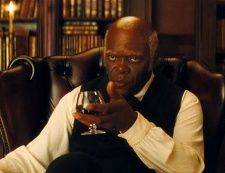 |
| Jamie Foxx and Leonardo DiCaprio in Django Unchained |
Eye For Film went one on four at the Ritz-Carlton Hotel in New York City with Leonardo DiCaprio, Samuel L Jackson, Quentin Tarantino, and Django, Jamie Foxx to find out about the provenance and creation of the most chilling villain of the year in Django Unchained.
Leonardo DiCaprio, who has said that he found nothing relatable in this role, plays antebellum plantation owner Calvin Candie, using phrenology to justify his cruelty in Tarantino's film about a former-slave-turned-bounty-hunter who sets out to rescue his wife from Candie's clutches. In a pivotal scene, the monstrous Candie holds a skull in his hands, while he explains racial differences by pointing to "three dimples for servility" in the "area of submissiveness." What we see is a skull, which, with brilliant simplicity, shows how under the skin we all look the same.

Anne-Katrin Titze to Leonardo DiCaprio: I have a question about the faces of evil. Quentin, you called it the "Black Auschwitz." When Calvin Candie contemplates the skull, he reminds me of a mix between the Grimms' fairy tale of The Prince who Feared Nothing (a not well-known tale about a bored prince and a punishment that includes a change of skin color) and Dr Josef Mengele (Nazi SS physician, infamous for his inhumane medical experimentation at Auschwitz). Could you talk about the possible inspirations for your character? You said you had nothing in common with Calvin Candie. Did you draw from the Mengeles of the world? Who inspired your evil?
Leonardo DiCaprio: You know, the phrenology sequence, you talk about, I think that's when the character in a culmination of everything came together in the end. Phrenology was that insane sort of pseudo science at the time. People tried to examine the inner workings of the human scull to determine our motivations, our instincts, our emotions.
What southern slave owners did, pre-Civil War, was use that pseudo bogus science to justify the difference between two people. And there is this walking contradiction: He's a Francophile who doesn't speak French, he thinks he's a scientist but he knows absolutely nothing about real science or what the hell he is talking about. And he starts to examine and prove to these people that, you know, essentially there is a difference between our two species. It's sort of an insane logic that he needed some sort of justification for treating people the way he did, and continuing with his life.
That was my connection to him. And he's also, he is that prince that is so incredibly self-indulgent that he thinks 24-hours-a-day what's going to satisfy him without any regard for other human life. I mean he was born into a world of privilege and wanted to sustain this plantation at any cost. Sustain this family lineage. At the time, for him, slaves, they were the oil of the south. To him they were the driving source that produced on a daily basis the crop, that gave them the money to sustain their business. And to take this away from him would strip away everything he had ever known in his life. It would have stripped him of his identity. I don't know if that answers your question?

Samuel L Jackson interrupts in character as Stephen, a.k.a. Snowball, Candie's butler and right-hand man: How dare you question his upbringing? I thought I did a good job!
Their on-screen relationship turns out to be much more complicated than it seems at first glance.
Quentin Tarantino: One thing needs to be said here, and it's a shocking thing to contemplate. The idea that on the planet earth there's not just Anglo-Saxon humans and the rest are sub-human. That being proven to not be the case is a relatively new idea. The idea of sub-humanity has existed such a long time. In fact, you know, Winston Churchill, as late as 1947, to kind of hold on to the British Empire in India, said 'we should not be embarrassed about Anglo-Saxon superiority. It's just the way it is.' That's Winston Churchill. This whole idea, you know, that there is no such thing as sub-humans… I didn't use animal analogies in this movie because I already wore that out in Inglourious Basterds. They would constantly use - a horse is not a donkey, a horse is not a zebra, they are sub of this. And the idea that we all think that's bullshit now is a relatively new idea.
Jamie Foxx enters into the discussion: There was a very interesting conversation, that's not in the movie… My question has always been: do slave masters go to heaven? I thought about, we didn't put this in the movie, but what does Django believe about god? Does Django have a beef with the man upstairs? Because the fact is, I was only born, I didn't have anything to do with being black. But all of a sudden, all of this is heaped upon me. Does Django actually believe that they are right because we are going through so much pain? Hopefully watching this film will spark a lot of conversation… This movie was like a gymnastics routine with all the flips and all the twists and he (Tarantino) landed as a perfect ten.
Django becomes Siegfried, straight out of the German legend, and his arduous quest to rescue his Broomhilda (Kerry Washington) out of the "circle of hell fire" eventually leads to Candyland, the notorious plantation ruled over by the devil.

Quentin Tarantino concludes with: Actually, Leonardo gave me a book. We've been talking about the phrenology coming from a scientific angle. You've been talking about it coming from the religious angle. He gave me a book that was called Negro, Beast Of Man. It wasn't even written in the 1800s, it was written in like 1904 or something. And I had this book and it introduced a word to me that I'd never heard before: The "Adamic Man". What it means is, their whole philosophy is, the proof that black folks are sub-human to white folks' humanity is the fact that, can it be possible that black folks are descendant from Adam and Eve? And to them it was absolutely positively 'no'. What are they using? They are using the stupid ass white illustrations that they've seen in the Bible, that they actually feel is like photographic evidence. But I had never even heard that expression "Adamic Man" before.
Tarantino uses many barbed lures in Django Unchained. The movie's comedic exaggerations, and the gallons of spilled red (so clearly not blood as though to illustrate the famous Godard quote) deliver us to serious issues on violence, a half deleted past, the nature of torture and an uncomfortable place where prejudice meets boredom, indifference equals terror and enjoyment of the unspeakable reigns supreme.
Django Unchained opens nationwide in the US on December 25, Christmas Day and in the UK on January 18.





















